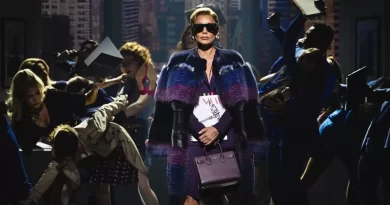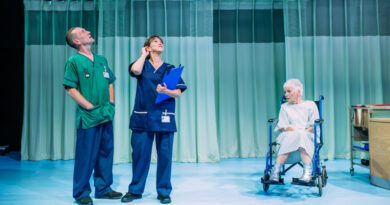“Next to Normal” at Wyndham’s Theatre
Jeremy Malies in the West End
1 July 2024
Give this your best attention if you want to see a musical investigate mental breakdown and (without any conspiracy-theory posturing) make accusations about “Big Pharma” prescription drug misuse by patients and consulting physicians in the US. Dodge it if you want a feel-good evening at the theatre, though the interchanges can be creasingly funny with cast members landing the many good gags satirizing middle-class entitlement across everybody from high-school pupils to celebrity psychiatrists.

Jamie Parker and Jack Wolfe.
Photo credit: Marc Brenner.
After a run at the Donmar Warehouse last autumn Michael Longhurst’s production of this 2008 Tony Award-winning rock musical (music Tom Kitt, lyrics and book Brian Yorkey) consciously tests an audience’s ability to empathize for the 145-minute (including interval) running time. I found it gruelling and could have done with some sugar to help the Pfizer (an occasional corporate target) pills go down.
Affluent suburban mother Diana played by Caissie Levy resorts to or is fobbed off with (the book leaves matters balanced) a cocktail of anti-depressants after a bereavement. Playing her son, Jack Wolfe has to project an ethereal quality at which he excels. His version of (perhaps the signature number) “I Am the One” with some part-singing with Levy sees him explore the darkness of his character forensically. Wolfe has to negotiate philosophical couplets in his lyrics such as “I am more than memory / I am what might be”. You leave the theatre understanding why the family will remain in unalloyed pain.
Levy’s depiction of the frenzied activity that can accompany a bipolar disorder is scary and never more so than when she decides to make the children’s school sandwiches on the floor. Bread flies across a minimalist set (comment on the family’s chic Bauhaus aesthetics not a conscious decision by designer Chloe Lamford) that includes the seemingly obligatory island kitchen. Lamford’s design uses a revolve which is sometimes a whirligig of time spinning characters back to their own childhood or that of a loved one.
Not a lot happens physically; director Longhurst understands that the key action is exploration of Diana’s psyche, and like a heroine from ancient Greece, she passes through an underworld that is mental illness. Levy establishes this within seconds when she tells the family that she feels she is only looking in on her life. Depiction of the collateral damage for husband Dan (Jamie Parker) and daughter Natalie (Eleanor Worthington-Cox) constitutes some of the finest acting of the night. But damaged or not, Worthington-Cox has great touch with her character’s put-downs of her relatives and boyfriend.
Lighting by Lee Curran often places rectangles of strip lights around the characters which I took as indicating how hard it is for them to truly communicate. Barriers are everywhere. Tal Rosner’s video projects whirling ellipses on the rear walls which I interpreted as Diana’s brain fog.
And the title Next to Normal? I take it that Diana’s course of electroconvulsive therapy (the set changes between the acts to include a clinic) and bulging medicine cabinet come achingly close to curing her. Psychotherapy, just like sport, is all about fine margins. As Levy plays with her child’s toy car on the apron of the stage, she is teetering (I believe) on full recovery.
And the decent gags? I loved Natalie’s question (she is a Mozart buff) to jazz-playing stoner boyfriend Jack Ofrecio: “How do you know when you’ve got it right?” The darker (almost gallows) humour has characters agreeing that people who believe they are happy just haven’t thought it through sufficiently! Could there be a few tweaks to the book for British audiences? When Natalie belittles her parents for choosing Portland as their elopement destination, I don’t get the joke.
All the cast are world-class vocalists and even when asked to sing numbers that span rock, country, and pop, they are equally at home in each genre.
You don’t win a Pulitzer Prize (2010 after a run at the Booth Theatre, New York) with crude diatribe. There is no tying-up of loose ends here and no prediction as to how any of the characters will fare though Diana seems confident that she will not degenerate into a soccer mom. When Natalie begins swallowing handfuls of uppers herself, a poignant moment has Ofrecio, who is watching this, sing: “No, I want who I knew. / She’s somewhere in you.” But Yorkey is far too subtle and thoughtful to simply dismiss conventional medicine as a solution for those who are depressed and grieving.
And yet, after this critique of medics who reach too readily for the prescription pad, I might just listen to the next influencer on social media who tells me to embrace the natural. Like Rent (also a Pulitzer winner) this is a musical that expands both the framework and vocabulary of its genre. Raw, uncompromising, and full of tough love. Wonderful.









